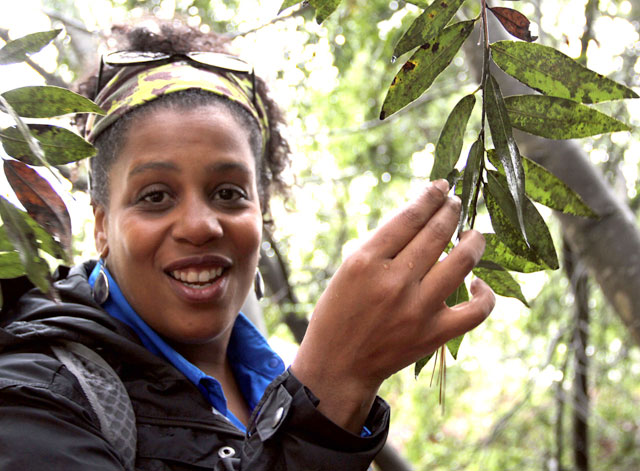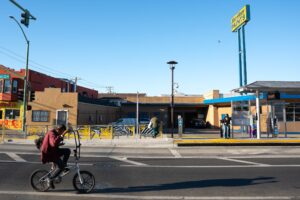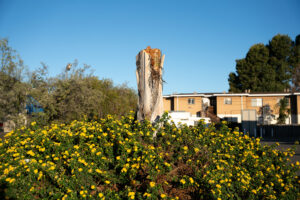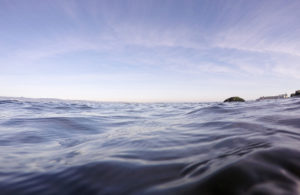Each new excursion begins with an opening circle with participants standing together below the trees, or wherever the event takes place. “I ask everyone what they love about the outdoors,” says Rue Mapp, the founder of Outdoor Afro, “leading with the assumption that everybody loves something.” Mapp says that once people begin talking, it is clear that everyone has a relationship with nature.
Outdoor Afro, founded in 2009, “celebrates and inspires” African-American connections to nature. From its beginnings in Oakland, the organization has expanded nationally and now has a team of 15 leaders in cities across the country. Following recent grand jury decisions in Ferguson, Missouri and Staten Island, New York not to indict white police officers in the killing of unarmed black men, Mapp and Outdoor Afro have also organized “healing hikes” as a way to turn to nature for emotional release. (The next local hike will be Saturday, Dec. 13, at Inspiration Point in Tilden Park.)
Mapp and I talked as she led an Outdoor Afro hike in Redwood Regional Park in the Oakland hills last weekend.
What are the main barriers to people of color getting out into nature?
Gear and equipment. Today we’re in the rain. You have to have the right shoes and rain gear to be comfortable and help enhance your experience. Secondly, transportation is an issue, when you are talking about connecting with a remote place like this. If you live in East Oakland, how would you get here, if you don’t have a car? Another barrier is fear. What we don’t know, or what’s been portrayed in the media as scary, where monsters are or bears are. Then it’s a big ask to go to the wilderness. Also, people are living with so much on their plate, it’s hard to figure out how to fit nature in, especially if you are living in a stressed community. The number one reason that [members of] Outdoor Afro weren’t getting out was time. Really it was about a perception of time. That’s why we have created opportunities close to home.
In a previous Bay Nature interview you describe a ranch you spent time at during your childhood as being “a great place to unplug from urban living.” What’s your take on social media and the use of technology as a tool to engage people with nature?
The thing that happened with social media that we didn’t anticipate was how much it was going to influence how people connect with each other; but also connect to opportunities to get out and do a variety of things. I’m really glad social media is a part of Outdoor Afro’s DNA, because it helps us have multiple connection points to meet people where they are. Quite frankly, if you look at Twitter and Facebook, that’s where people of color are and that’s where they are talking to each other. That’s where they’re high-fiving their experiences and I am really glad about the ways Outdoor Afro has been able to leverage those platforms to tell our stories.
To celebrate the 50th anniversary of the Wilderness Act, you went to the Arctic with Sierra Club Executive Director Michael Brune and musician and 2014 National Geographic “Emerging Explorer” Paul D. Miller. What was that like?
It was epic. It was life changing and life affirming. Not only did I get familiar with the place, but also with the people who live there. For me, and with Outdoor Afro, it’s always about people, places and seeing. Living among the Gwich’in people and the porcupine caribou that the Gwich’in people have depended on for time eternal was really powerful and created a lasting bond that I feel between me and that place and the people. It inspired me to tell their story and advocate for the protection of that space. I see it as connected to what is happening in East Oakland. It’s not only the 50th anniversary of the Wilderness Act, but it is also the 50th anniversary of the Civil Rights Act. Right now we have this grand opportunity. Even though the connection wasn’t made back then, it was a time when our country was able to come together and make this big statement to protect vulnerable people and vulnerable places. Right now, people don’t feel connected and don’t feel safe in the outdoors. We have a moral imperative to help people find and strengthen those connections. Think about the quality of your life when you have access and feel included in places like this, versus if you don’t. I would argue that, given all that people benefit from, without the chance to experience places like this does cause harm and reinforces all the things that we come here to release, like stress.
You’ve said that the work you are doing is about love, affirmation, and reconnection. Do you have any stories of trips or hikes that demonstrate these ideas?
All of them. Every last one. I definitely wish you were here for the last Ferguson healing hike we did. We had about 30 people the Friday after Thanksgiving and that hike was amazing. We started off with yoga. Then we went into this valley of redwoods and we asked people what they were bringing with them. With so much complexity in how we all feel. There’s a spiritual in our community that we all know about laying your burdens down by the riverside. We were actually by a river and we asked people what they were bringing to leave behind and then most importantly, as we ascended out of that valley and asked, “What are you going to be carrying forth? What will you be rising up to do to support healing and reconnection in your families, in your communities and in your workplace?” People sharing from those prompts was incredibly powerful. We’re going to repeat that hike on the 13th of December, recognizing that we got hit again. We got hit with another blow, with our wounds not even healed from the news of Ferguson and with the news out of New York. We have a nationwide call to action for healing hikes. The Sierra Club and other organizations have partnered with us to promote it. Not everybody wants to protest in the streets. There are people who want to do things with their families and with their children, so this provides an opportunity for that to happen. I’m not judging how people choose to respond. It’s just another way.
How is being in nature healing?
At minimum, it gives us a break from the stress that we carry in our lives. The stress of to-do lists, of needing to be productive. Maybe people have very specific things happening in their lives that we never necessarily hear about on the trail, but when we do our closing, we always ask people to share how they feel and people will say things like: “peace, happy, joy, connected, love.” They didn’t start out the hike saying those things. They’re going to carry that into their world. That’s how I know, and of course people give us feedback and let us know all the ways that they benefit personally from the experience of being with Outdoor Afro. I also know how I feel. People want to feel connected again, even though we love social media and computer technology, people want to meet other people, talk to other people and this provides a very open platform, in a nonthreatening way, for people to do that.
Find out more about Outdoor Afro at outdoorafro.com
Laki Sarah is a graduate student reporter at the UC Berkeley Graduate School of Journalism. This story was produced as part of a J-school class focusing on environmental issues in the Bay Area.





